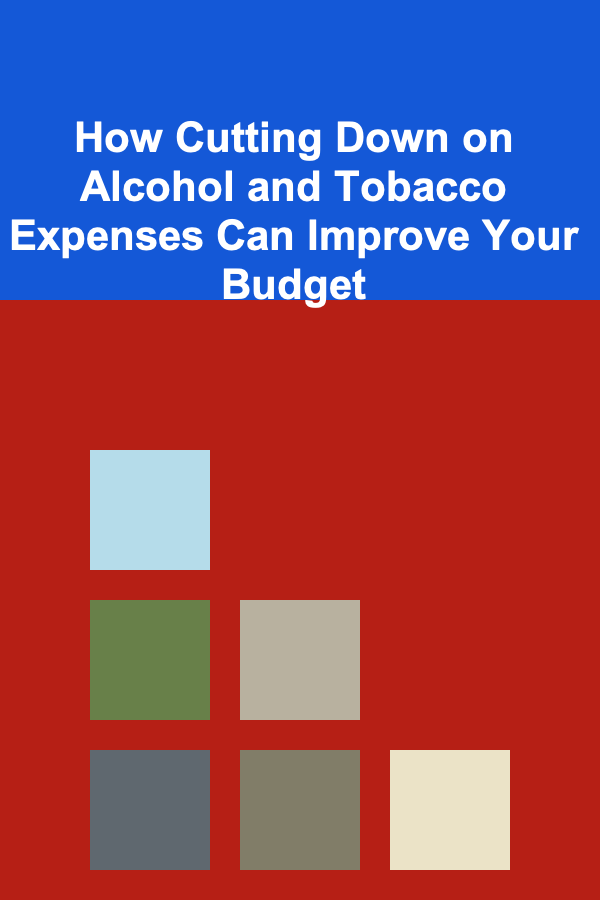
How Cutting Down on Alcohol and Tobacco Expenses Can Improve Your Budget
ebook include PDF & Audio bundle (Micro Guide)
$12.99$7.99
Limited Time Offer! Order within the next:

Managing personal finances is a crucial part of leading a financially secure and balanced life. While many focus on large expenses like housing, transportation, or entertainment, often overlooked are smaller, recurring costs that can slowly eat away at your savings---one of the most significant being alcohol and tobacco consumption. Cutting down on these habits not only improves your health but also allows you to free up a surprising amount of money. In this actionable guide, we will dive deep into how reducing your spending on alcohol and tobacco can enhance your financial well-being and help you achieve your budgeting goals.
The Financial Impact of Alcohol and Tobacco Habits
Before we discuss the benefits of cutting back on these expenses, it's important to understand just how much they might be costing you. The numbers can add up quickly, especially if these are habits you've had for years.
Alcohol Expenses
Alcohol consumption is a common social activity, and while it can seem harmless in moderation, it's easy for small purchases to snowball. According to several studies, the average American spends hundreds, if not thousands, of dollars annually on alcohol. Whether it's a couple of drinks at dinner, weekly happy hours with friends, or occasional wine purchases for home, these expenses often go unnoticed until the end of the year.
- At-Home Drinking: A bottle of wine or a six-pack of beer may not seem expensive on its own, but if you're purchasing them regularly, this can quickly become a significant expense. For instance, a bottle of mid-range wine might cost $15, and if you consume two bottles per week, you are looking at $1,560 annually.
- Dining Out and Socializing: Drinks at bars and restaurants tend to be far more expensive. A cocktail or beer at a bar might cost anywhere from $5 to $15, depending on the location. If you're socializing frequently, this can add up to hundreds of dollars per month.
Tobacco Expenses
Tobacco products, especially cigarettes, are another significant drain on finances. In addition to the cost of the products themselves, tobacco consumption is linked to several health risks, leading to potential medical expenses over time.
- Cigarettes: The cost of cigarettes varies depending on the country and even the state or region. On average, in the United States, a pack of cigarettes costs between $6 to $10. A smoker who goes through a pack a day will spend between $2,190 and $3,650 annually on cigarettes alone.
- Other Tobacco Products: If you're using other tobacco products like cigars, smokeless tobacco, or e-cigarettes, the costs can add up similarly. These products may have lower upfront costs but can still have a cumulative financial impact.
The Hidden Costs
In addition to the direct costs of alcohol and tobacco, there are hidden expenses that can result from these habits. These can include:
- Health Insurance Premiums: Both alcohol consumption and tobacco use can result in higher health risks, leading to increased insurance premiums. Smokers, for instance, can face premiums that are 20% to 50% higher than non-smokers.
- Lost Productivity: Excessive alcohol consumption can lead to missed workdays or reduced productivity. Similarly, tobacco use may increase the likelihood of sick days due to respiratory illnesses or other health problems.
- Long-Term Health Costs: Chronic smoking or heavy drinking can lead to costly health conditions such as cancer, liver disease, and heart disease, not to mention the emotional and financial strain that comes with caring for health issues.
The Benefits of Cutting Back on Alcohol and Tobacco Expenses
Now that we've established the financial burden alcohol and tobacco can impose, let's explore how cutting back on these expenses can improve your budget---and your life.
1. Free Up Money for Savings and Investments
The most immediate benefit of reducing your spending on alcohol and tobacco is the money you'll save. When you stop spending money on these items, that money can be diverted toward more productive uses, such as:
- Emergency Fund: The first step in improving your financial security is building an emergency fund. Even cutting out one drink or pack of cigarettes a week can quickly add up to substantial savings.
- Retirement Savings: Whether you invest in an IRA, 401(k), or other retirement vehicles, reducing unnecessary expenses can allow you to invest more for the future. Even small, consistent contributions can grow significantly over time due to compound interest.
- Debt Repayment: If you have credit card debt, student loans, or other outstanding loans, cutting back on alcohol and tobacco can free up money to accelerate your repayment schedule, reducing the amount you pay in interest over time.
2. Improve Your Health and Well-being
Health and finances are often closely intertwined. The money you save by cutting back on alcohol and tobacco can contribute to a healthier lifestyle. Here's how:
- Better Health Outcomes: Both smoking and excessive drinking are linked to numerous health issues, including lung disease, liver disease, heart disease, and cancer. By reducing or eliminating these habits, you're reducing your risk of developing these conditions and the associated healthcare costs.
- Mental and Emotional Benefits: Alcohol is often used as a coping mechanism for stress, while smoking is a known habit for managing anxiety or boredom. Cutting back on these habits can encourage you to find healthier ways of coping, such as exercise or mindfulness practices. This shift can lead to a better emotional and mental state, contributing to your overall well-being.
- Increased Energy and Focus: Many people find that they have more energy and clarity after cutting down on alcohol and tobacco. Whether it's waking up feeling more refreshed or feeling more productive throughout the day, these benefits can have a positive impact on your professional and personal life.
3. Increase Long-Term Financial Security
Reducing alcohol and tobacco expenses doesn't just free up money in the short term---it can also increase your long-term financial security.
- Lower Health Care Costs: By quitting smoking or drinking less, you'll lower your risk of expensive medical conditions, which can result in fewer medical bills, lower insurance premiums, and fewer prescriptions. Over time, this can save you thousands of dollars in healthcare-related expenses.
- Avoid Costly Habits: Smoking and heavy drinking often lead to other expensive habits. When you stop these habits, you might also reduce other associated costs, such as eating out more frequently, buying junk food, or spending money on unhealthy entertainment.
4. Build a More Sustainable Lifestyle
Cutting back on alcohol and tobacco consumption can be part of a broader strategy for living a more sustainable and financially responsible lifestyle. Whether it's adopting healthier eating habits, reducing impulse purchases, or choosing more affordable entertainment options, the discipline you develop by cutting back on alcohol and tobacco can carry over into other areas of your life.
- More Mindful Spending: When you become more conscious of your alcohol and tobacco consumption, it can help you become more aware of other areas where you might be overspending. You might start tracking your expenses more carefully and thinking critically about where you allocate your money.
- Environmental Impact: Tobacco and alcohol production have environmental impacts, such as pollution, deforestation, and water waste. Reducing consumption of these products can contribute to a more sustainable planet.
How to Start Cutting Back
If you're ready to reduce your alcohol and tobacco consumption but don't know where to begin, here are some actionable steps to help you get started:
- Track Your Spending: Begin by tracking exactly how much you're spending on alcohol and tobacco each month. Knowing the numbers will make the financial impact clear and motivate you to make a change.
- Set Clear Goals: Whether you want to quit entirely or simply cut back, setting measurable goals will help you stay on track. For example, if you're a smoker, you could start by reducing your daily intake by one cigarette at a time.
- Find Healthier Alternatives: Replace alcohol with non-alcoholic beverages like sparkling water or herbal teas. For tobacco, consider nicotine-free options or nicotine patches as a substitute to help manage cravings.
- Build a Support System: Having a friend, family member, or support group to encourage you and hold you accountable can significantly increase your chances of success.
Conclusion
Cutting back on alcohol and tobacco is a powerful way to improve both your financial and physical health. While these habits might seem small individually, they can have a significant impact on your budget over time. By reducing your spending in these areas, you can free up money for savings, investments, and debt repayment, while also improving your overall well-being. Whether it's for health reasons, financial goals, or both, making the decision to cut back on alcohol and tobacco can set you on a path to greater financial security and a healthier lifestyle.
Reading More From Our Other Websites
- [Personal Care Tips 101] How to Apply Foundation with a Beauty Blender
- [Organization Tip 101] How to Use Social Media for Event Engagement and Updates
- [Home Budget 101] How to Budget for Home Entertainment (Streaming, Gaming, etc.)
- [Home Security 101] How to Set Up Lorex Wireless Security Cameras for Maximum Coverage
- [Organization Tip 101] Why You Should Invest in Sustainable Storage Options
- [Home Maintenance 101] How to Implement Regular Home Maintenance Routines for Longevity
- [Home Staging 101] How to Stage Your Home During the Holidays for Maximum Impact
- [Home Maintenance 101] How to Keep Your Home's Air Ducts Clean and Maintained
- [Skydiving Tip 101] Best High‑Performance Wingsuits for Aerodynamic Maneuvering in Strong Winds
- [Survival Kit 101] How to Build a Low‑Light Survival Kit for Cave Explorers and Night‑time Spelunkers

How to Create a Checklist for Organizing Your Closet: A Step-by-Step Guide
Read More
How to Soundproof a Nursery for Your Baby's Safety and Quiet
Read More
International Relations: Concepts and Forces Shaping Our World
Read More
How to Understand the Role of Sleep in Fitness
Read More
How to Predict Drug-Drug Interactions Using Pharmacological Principles
Read More
10 Tips for Photographing Your Toy Collection for Online Sales
Read MoreOther Products

How to Create a Checklist for Organizing Your Closet: A Step-by-Step Guide
Read More
How to Soundproof a Nursery for Your Baby's Safety and Quiet
Read More
International Relations: Concepts and Forces Shaping Our World
Read More
How to Understand the Role of Sleep in Fitness
Read More
How to Predict Drug-Drug Interactions Using Pharmacological Principles
Read More